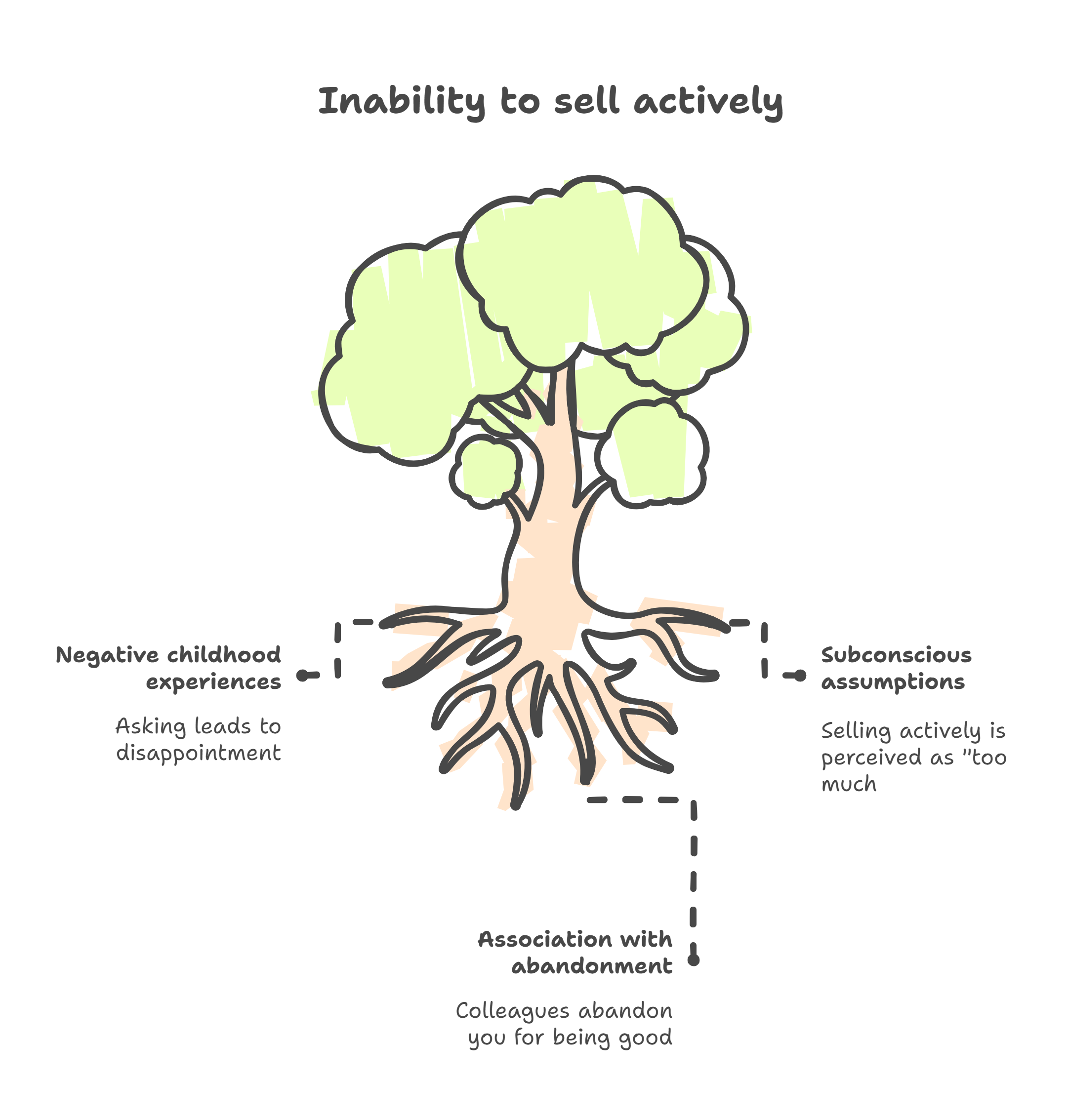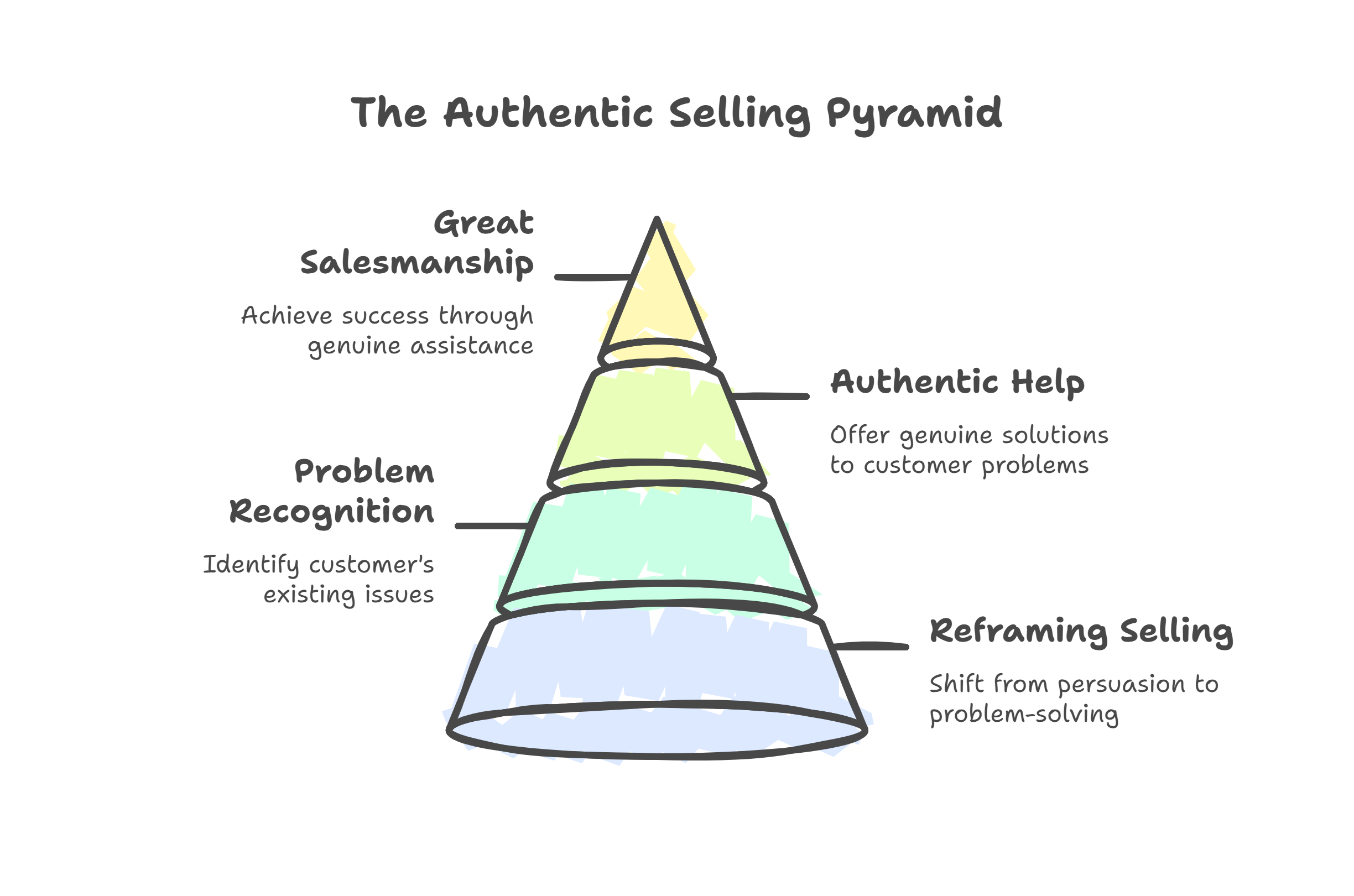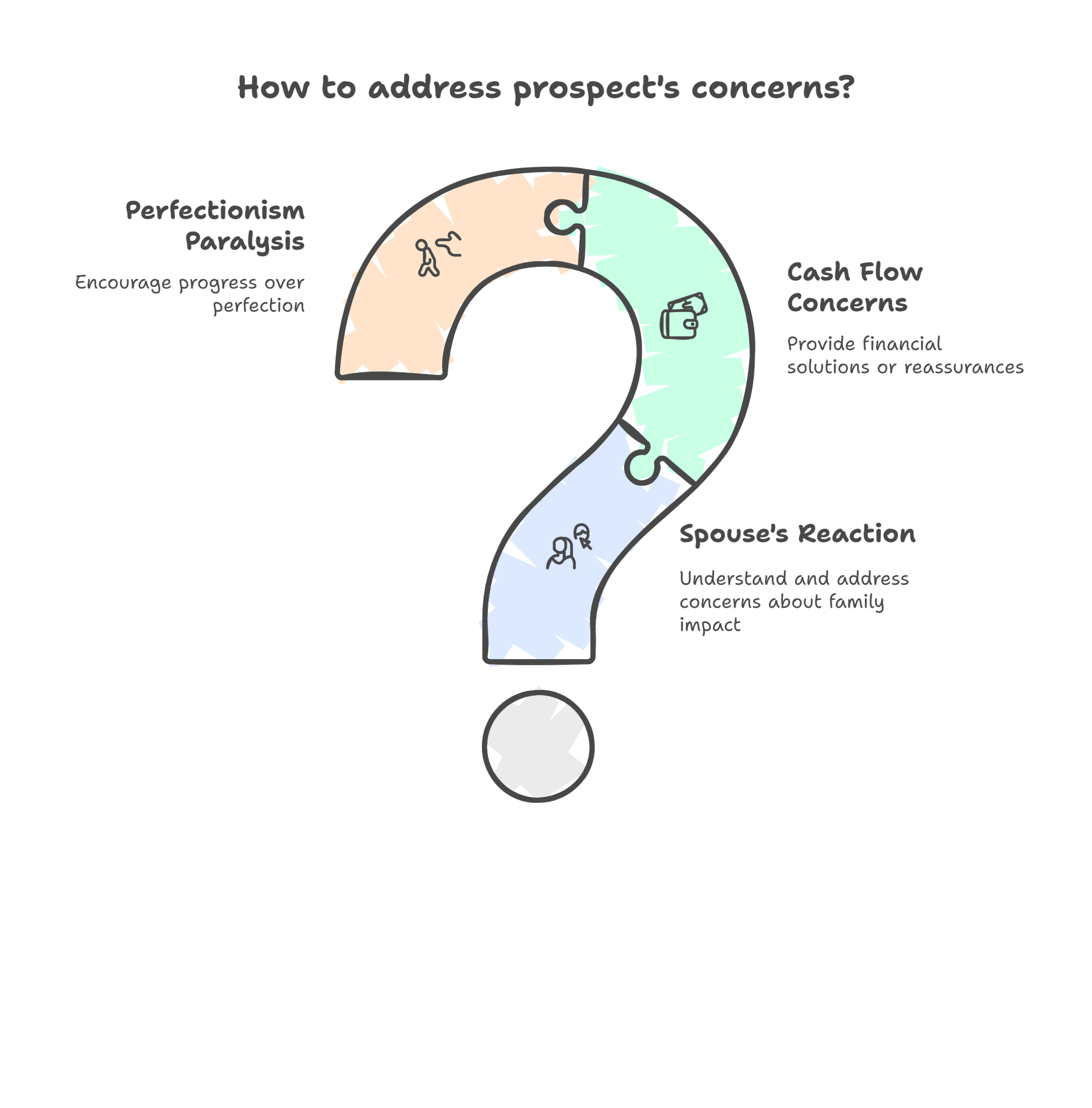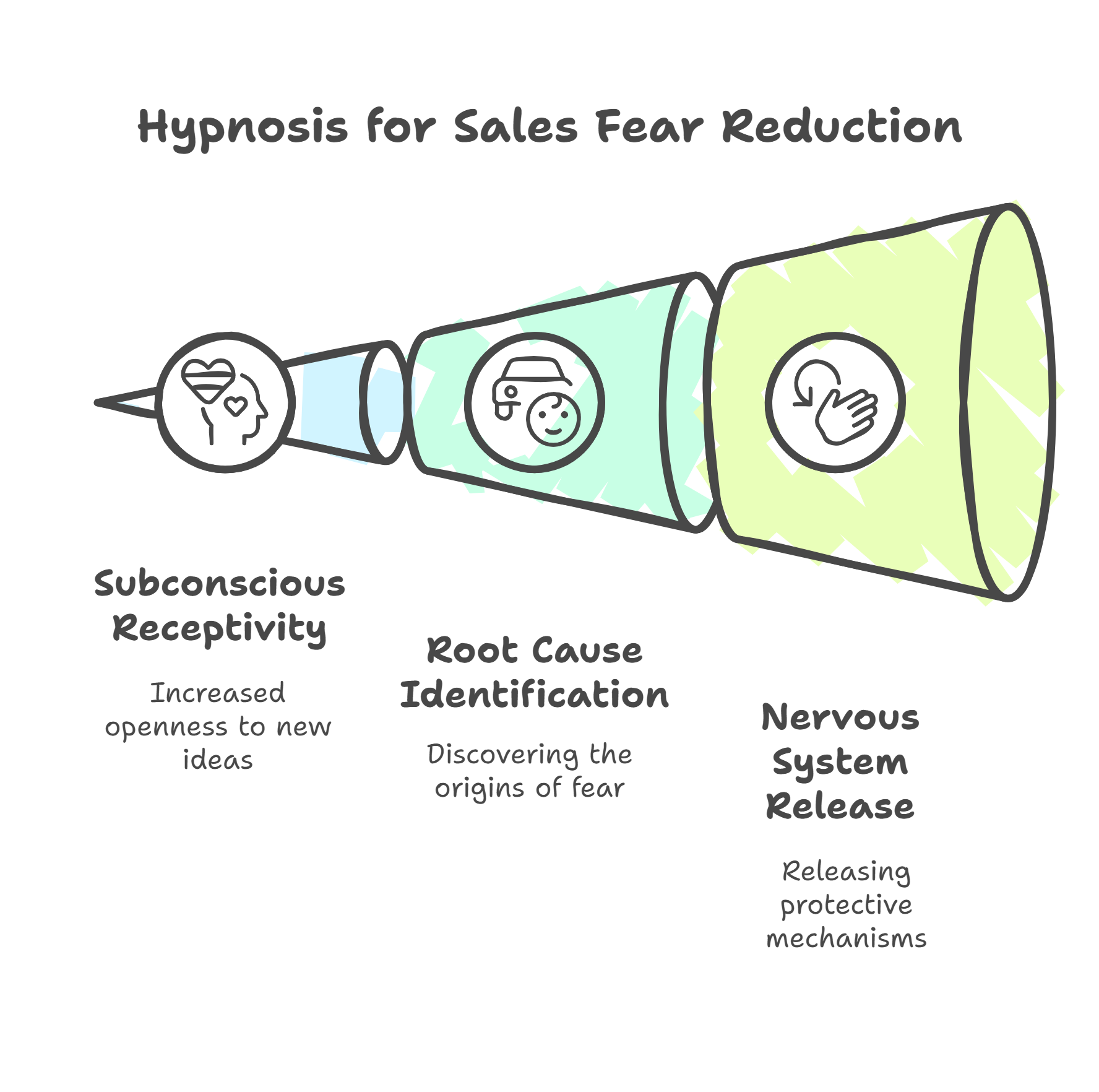Real scenario: You know your product or service could genuinely transform peoples’ lives. You have seen the results. You believe in what you offer. Yet when it comes time to have that sales conversation…
your heart races,
your palms sweat,
and suddenly you are stumbling over words that should flow naturally.
You are not alone.
Learning how to be a great salesman doesn’t mean becoming someone else or being aggressive. You must let go of the fears that block your natural ability to connect and serve. This blog tells you how to:
- Reframe what it means “to sell.”
- Calm your nervous system.
- Close with confidence even if rejection feels like a personal attack.
*clients’ names have been changed for privacy.
Why Selling Triggers Fear, Shame, and Freeze?
You must recognise why selling feels so threatening to your nervous system to understand how to be a great salesman. Your brain doesn’t distinguish between a business rejection and a survival threat when you approach a sales conversation.
Research shows that social rejection activates the same pain pathways as physical injury, triggering our fight-flight-freeze response.
Early Conditioning
Your inner judgmental voice builds this reaction more because of your negative childhood experiences. Perhaps you were told to “stop being pushy” or learned that asking for what you need leads to disappointment.
This conditioning might let your subconscious assume that selling actively is “too much.” Or, you may have associated it with your colleagues abandoning you if you became too good at selling.
Client’s example: Audrey, an insurance broker, came to our clinic paralyzed by sales calls. Her fear of communicating with clients had declined her performance over the years. During sessions, we uncovered a memory from age seven, during a presentation, her teacher publicly laughed at her when she stumbled at her words. Her subconscious had been protecting her from that shame ever since, creating elaborate procrastination patterns around prospecting.
Studies in developmental psychology reveal that early rejection experiences literally reshape neural pathways, making us hypersensitive to perceived social threats later in life.
The therapist insight here is important:
Sales anxiety isn’t about selling—it is about unresolved emotional imprints that get triggered when you risk being seen and potentially rejected.

Selling = Helping (Rewriting the Script)
The foundation of how to be a great salesman lies in reframing your entire relationship with selling. Instead of viewing it as persuasion or convincing, recognise that authentic selling is simply helping someone solve a problem they already have.
- Would you hesitate to offer help if someone was drowning?
- Would you worry about being “pushy” if you saw someone walking toward a cliff?
Of course not.
Focus On Serving Others
Selling becomes a service instead of a transaction when you truly believe in your solution and genuinely care about your prospect’s wellbeing.
Research shows that salespeople who focus on customers’ needs rather than persuading achieve higher close rates. This change isn’t just about the method—it is about nervous system regulation.
Client’s example: Marcus, a software sales executive, changed his approach after working with us. He began conversations with genuine curiosity instead of launching into product features: “What is the biggest challenge you are facing with your current system?”
This empathy-based approach improved his results. It also ended the anxiety that made him avoid calls for hours previously.
The neurological impact is profound. When you operate from a service mindset instead of worrying about the outcome or how people look at you, your parasympathetic nervous system activates. This builds calm confidence.

Calm the Nervous System Before the Call
You must consider the physiological component of sales anxiety to find out how to be a great salesman. Your nervous system needs to feel safe before you can show up authentically. This isn’t about “psyching yourself up”—it’s about genuine regulation.
Breathing Technique
Begin with breathwork that activates your vagus nerve.
Try the 4-7-8 technique:
- Inhale for four counts
- Hold for seven
- Exhale for eight
Research confirms that controlled breathing directly impacts the autonomic nervous system, reducing cortisol and activating the rest-and-digest response.
Somatic Grounding
Somatic grounding techniques help you stay focused on the present.
- Feel your feet on the floor
- Notice five things you can see
- Four you can hear
- Three you can touch
This interrupts the anxiety spiral and brings you back to your resourceful state.
Personal Rituals
You can also make a pre-call ritual that can help your subconscious feel safe. You can:
- Light a (scented or plain) candle
- Play specific music
- Hold a meaningful object to calm yourself
Psychological research shows that consistent rituals reduce anxiety and increase feelings of control and confidence.
Client’s example: One client, Leena, was a real estate agent. She developed a powerful visualisation method. Before each client meeting, she imagined herself as a trusted advisor helping families find their perfect home.
She anchored this feeling by touching a small stone her daughter gave her. As a result, her closing anxiety disappeared within weeks. Also, her sales increased by 40%.
The foremost reframe: “I am safe even if they say no.”
This isn’t positive thinking, it is nervous system education. Your survival doesn’t depend on this sale. Your worth isn’t determined by their decision. You are offering a gift, not begging for approval.
When “No” Isn’t Really About You
Learning how to be a great salesman means understanding that most objections come from your prospect’s own fears, not your inadequacy.
Do they say:
- “I need to think about it”
- “It is too expensive”
They are often expressing their own anxiety about:
- Making the wrong decision
- Looking foolish
- Facing buyer’s remorse
Consumer psychology research shows that most of purchase hesitation comes from fear-based thinking rather than logical concerns. Your prospect might be worried about:
- Their spouse’s reaction
- Concerned about cash flow
- Simply paralysed by perfectionism
Learn to coach through it with compassion instead of absorbing their resistance as personal rejection. “It sounds like this feels like a big decision. What would need to happen for you to feel confident moving forward?” This approach changes objections into opportunities for deeper connection.
Client’s example: Our client David, a financial advisor, struggled with “price objections.” However, things got better when he reframed them as trust issues. Instead of defending his fees, he began exploring: “Help me understand what is behind that concern.”
Often, prospects revealed fears about:
- Previous bad experiences
- Explaining the expense to family members
His conversion rate doubled when he addressed the emotional root.
The nervous system component is important here. Your amygdala activates when you interpret “no” as personal rejection. It floods your system with stress hormones and impairs your ability to think clearly.
Studies show that perceived social rejection literally hijacks executive function. That makes it impossible to respond resourcefully.
*Stay grounded in this truth: their “no” is not ***a rejection towards you as a person. It is a rejection to the service or product.

Embody Your Worth (People Buy People)
You must recognise that people don’t just buy products or services if you want to know how to be a great salesman. They buy the energy and confidence of the person selling them. If you don’t believe in your own value, how can you expect others to invest in what you offer?
Research shows that confidence is literally contagious through mirror neurons. When you embody genuine self-worth, prospects unconsciously mirror that state, making them more likely to see value in your offering.
Make Their Feelings Your Own
Before any sales conversation, anchor into your past client wins. Remember specific transformations you’ve facilitated. Feel the gratitude in that client’s voice when they thanked you. This isn’t ego—it’s evidence of your legitimate impact.
Client’s example: Amanda was a business coach. She kept a “wins folder” on her phone with client testimonials and success stories. Before challenging calls, she had read three of them.
It allowed that energy of service and success to fill her system. Her confidence became magnetic, attracting ideal clients who were ready to invest.
The neuroscience is fascinating. Studies show that when you remember success stories, they activate the same neural networks activate as during that actual achievement.
Self-worth isn’t selfish. It is necessary for authentic service. You don’t need to convince or manipulate when you know your value.
You simply share what is possible and allow people to choose. This energy attracts aligned clients while repelling those who aren’t ready for change.
Trust becomes the foundation. You trust your ability to deliver results. You trust that the right people will recognise value. You trust that rejection protects both of you from misaligned partnerships.
Why Hypnotherapy Can Rewire Sales Anxiety at the Root?
How to be a great salesman? It may feel impossible for anxious professionals. The real breakthrough comes from healing the subconscious programs that created the fear in the first place.
Sales anxiety often stems from early emotional imprints—moments when being visible led to:
- Rejection
- Shame
- Criticism
These experiences create protective patterns that served you then but sabotage you now. Research in clinical hypnosis shows that hypnotherapy can access and reprocess these memories, literally changing neural pathways.
During hypnosis, your conscious mind relaxes while your subconscious becomes highly receptive to new programming. We can identify the root cause of your sales fear:
- A childhood moment when your parents scolded you over something trivial.
- A childhood or teenage experience of public humiliation.
This can help your nervous system release its protective grip.
The process isn’t about reliving trauma but about giving your younger self the resources they needed then. In a safe, hypnotic state, we can provide:
- Comfort
- Validation
- New perspectives that your subconscious accepts as truth
This creates lasting change that no amount of positive thinking can achieve.
Client’s example: A pharmaceutical sales rep Jake, found out that his fear built due to his father criticising “pushy salespeople” during his childhood.
Through hypnotherapy, he reframed selling as education and service, aligning with his core values. Within a month, his call anxiety disappeared. Eventually, he became his company’s top performer.
Hypnotherapy eliminates them by addressing the cause instead of managing anxiety symptoms. This allows you to show up:
- Naturally confident
- Genuinely curious
- Authentically helpful in sales situations
The transformation often surprises clients—selling begins to feel effortless because it is no longer filtered through old wounds.

Client Transformation: From Frozen to Flourishing
Jennifer, a mortgage broker with fifteen years of experience, came to our clinic unable to make prospecting calls. She had stellar expertise and track record. Even then, she had developed such severe call anxiety that she was considering leaving the industry.
Past Experiences
During our sessions, we uncovered a pattern that began in elementary school. She was repeatedly told to “wait your turn” and “don’t interrupt.”
Her subconscious had learned that speaking up led to rejection and shame. This programming created a perfect storm in sales situations. The more important the call, the more her system would freeze.
MIHH Intervention
Hypnotherapy helped her nervous system understand that adult professional conversations were different from childhood dynamics.
We installed new programming around her right to share valuable information and her responsibility to help people solve problems.
Result
The change was remarkable. Jennifer was making confident calls and enjoying the process within six weeks. “Selling now feels like service, not pressure,” she told me.
Her business grew by 60% in the following quarter. Nonetheless, more importantly, she rediscovered her love for helping families achieve homeownership.
In a Nutshell
Looking for how to be a great salesman doesn’t require you becoming someone. You must let go of your fears that make you hesitate to connect with your consumer base better. So, you must reframe selling as helping to calm your nervous system. Sales become natural when you resolve the root causes of anxiety. Your authenticity is your best sales strategy.
Ready to release sales fear and step into authentic leadership? Book your free consultation today and see what is possible when anxiety no longer controls your success.
FAQs
Why Do I Get So Nervous When Trying to Sell Something?
Sales anxiety happens when your brain interprets potential rejection as a survival threat. It activates the same pain pathways as physical injury. If you were told to “stop being pushy” or faced criticism for being visible in childhood, this can create subconscious protective patterns.
Your nervous system doesn’t distinguish between business rejection and personal danger. This may trigger fight-flight-freeze responses. So, selling can feel threatening even when you believe in your product.
How Can I Stop Taking Sales Rejection Personally?
You must understand that most “no” responses reflect your prospect’s own fears rather than your inadequacy. It can help you manage emotional detachment. Purchase hesitation usually comes from fear-based thinking:
- Worry about making wrong decisions
- Spouse reactions
- Past bad experiences
Based on this knowledge, you can reframe objections as information about their internal state. That way, you can respond with compassion instead of taking their resistance as personal rejection.
What Is the Best Way to Calm My Nerves Before a Sales Call?
Regulate your nervous system first using the 4-7-8 breathing technique to activate your parasympathetic response:
- Inhale 4 counts
- Hold for 7 counts
- Exhale for 8 counts
Create pre-call rituals like reviewing past client success stories to anchor into evidence of your value. Use somatic grounding – feel your feet on the floor, notice your surroundings – to stay present rather than spiraling into anxiety about potential outcomes.








